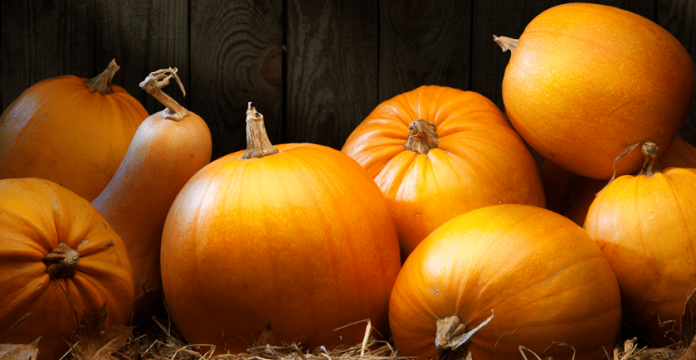
Pumpkins are one of the best things about fall. From making jack-o-lanterns for Halloween to pumpkin spice lattes to festive pumpkin pies, we love this superstar squash. But before you head to the pumpkin patch, there are some important (and surprising) things you should know:
1. Pumpkins are high in nutrition
Pumpkins are low in calories, fat, and sodium and high in fiber. They are a good source of Vitamin A, Vitamin B, potassium, protein, and iron. They also contain free-radical scavenging antioxidants, which can give your health a much-needed boost during the holiday season.
2. Pumpkin seeds are also nutritious
Just how nutritious are pumpkin seeds? Let me count the ways. Pumpkin seeds are packed with magnesium, zinc and Omega-3 fats. They contain tryptophan for restful sleep, are good for prostate health and aid in reducing menopausal symptoms. Pumpkin seeds have both anti-diabetic and anti-inflammatory effects, and are good for the liver and the heart. Pumpkin seeds are also excellent for those suffering with intestinal parasites. Because they are portable and do not require refrigeration, they make great travel snacks for the car, the office, or a day of adventuring.
3. Plant your own pumpkins
After you’ve carved out your scary jack-o-lantern face, save your seeds to plant the following year. Pumpkin seeds should be planted between the last week of May and the middle of June.They take roughly 120 days to grow, and are picked in October. Watching your pumpkin patch grow is a great way to teach your kids how to garden, and how to care for the environment. Pumpkins when planted in non-organic gardening soil can also help start the clean up process of your soil if you’re aiming to plant a chemical-free garden the following spring.
4. Choose organic pumpkins.
Many organizations claim pumpkins are relatively safe because of their thick skin. However, most of the chemicals used in pumpkin production are systemic, therefore the chemicals are in the pumpkin flesh and will not wash off of your pumpkin. In 2014, California pumpkin farmers dumped close to 14 thousand pounds of Malathion to meet the supply of Halloween pumpkins. For reference, Malathion is a suspected endocrine disrupter, cholinesterase inhibiter and a possible carcinogen. Buying an organic pumpkin is easy, and tells next year’s pumpkin farmers that they need to grow organic!
5. Pumpkins: a farmer’s clean-up crop
Farmers know that pumpkins are very efficient at absorbing poisons from the soil. Therefore, some non-organic farmers and landowners use pumpkins as a filter to clean up contamination like DDT, PCBs and Dioxins. If you aren't buying organic pumpkins, essentially you are consuming whatever land, water, and chemical contamination your pumpkin absorbed! Why would anyone knowingly bring those toxins into their home? This knowledge backs up number four on this list, which is to always purchase certified organic pumpkins.
6. Compost your pumpkins!
Don't throw your pumpkins in the trash after Halloween or Thanksgiving. When organic matter breaks down, it releases the gas methane. Methane is a significant greenhouse gas with 25 times the strength of carbon dioxide. Imagine the amount of pumpkins that end up in landfills? And those landfills contribute nearly 20% of all methane emissions in the U.S. If you've purchased an organic pumpkin, compost it as future nutrients for your garden soil. For a conventional pumpkin, recycle it into your yard waste pile so that it doesn't end up in a landfill and contribute to global warming.
7. Buy edible pumpkins
Reduce, re-use and recycle! When you buy edible pumpkins you can use the pumpkin flesh to make pies and soups, the core to make a decoration like a jack-o-lantern and you get to eat the seeds. The smell of homemade pumpkin pie always whips my taste buds into a flurry. If pumpkin pie isn’t your thing, there are hundreds of delicious recipes from chili to pumpkin smoothies to use the remaining pumpkin flesh! Here are some recipes we recommend from Naturally Savvy:
6 Creative pumpkin recipes
Hot Pumpkin and Goji Berry Smoothie
Pumpkin Cinnamon Walnut Pancakes
Pumpkin can be a fun, nutritious addition to your fall routine. Armed with this information, you'll be able to get the most out of your pumpkins for your whole family.
Read this next: The Surprising Health Benefits of Potatoes [Plus Recipe and Video]










